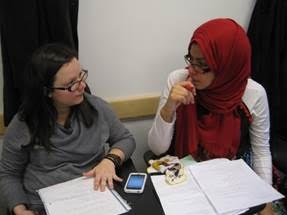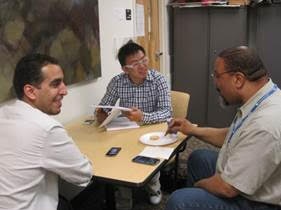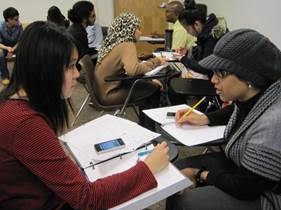|
| |
Interview as Outreach: Activities & Services for StudentsSherry RasmussenMany of our colleges and universities offer more to students than English classes, but how do your students learn about those other services and activities? Perhaps they attend an orientation when they first arrive, but how much of that information can they retain when they are just trying to adjust and focus on their classes? A speaking and listening activity in my High-Intermediate class addresses interviewing, presenting, listening, and note-taking skills while students find out about a variety of services and activities available to them. The students learn in a fun and memorable way: by interviewing staff from the offices that offer these services and activities. During the term, the Spoken English students listen to StoryCorps (from National Public Radio), completing comprehension and vocabulary handouts. When it comes time to organize their own interview questions, they also visit the StoryCorps website for ideas.  At least a week before the interviews, I group the interviewers into pairs or triads of students who have different native languages. A representative from each group pulls a name from a hat to find out whom the group will be interviewing and which office the person represents. Then, the group organizes its questions around that person. Offices and departments interviewed in the past have included: the counseling center; LBGTQ center; the writing center; the Office for International Students & Scholars (which advises students on visa matters and offers social activities); International Admissions; University Ministry (which offers volunteer opportunities and social activities); Student Affairs; and the Computer & Digital Media and Business colleges, two areas of study very popular among our international students. Students are instructed to ask questions about the person, the office, and what the office/department does for students. The groups come up with a list of questions (making sure each question is grammatically correct), and we talk about how to conduct friendly interviews to gather information. During one class time, the interviewees come to our class to meet with their group of students for one hour. (I secure the interviewees’ participation and notify each one of the date, place, and time several weeks in advance.) Students are told to take notes, even if their interviewee agrees to be recorded. They also get the email address of the interviewee in case they think of further questions to ask later. During the interview, the students make a new friend with their interviewee and learn about what the office does for students. In exchange, the interviewees, many of whom work only indirectly with students, get to know some international students and to promote their programs.  In subsequent days after the interview, the students meet together in their groups to organize their data into a PowerPoint, addressing the 3 areas for which they were instructed to gather information during the interview. We explore how to use PowerPoint effectively so that the students actually speak to us during the presentation (not just read slides). The groups then present their PowerPoint to the rest of the class so that everyone can learn about the variety of services and programs available to international students (with each student speaking for at least 5 minutes).  Feedback from students has been very positive, not only because they believe the process helped them improve their English and learn more about activities and services, but they gained confidence as well:
 Sherry Rasmussen has been an ESL/EFL teacher and teacher-trainer for almost 30 years, and currently teaches fulltime at DePaul University, Chicago. | |
| ITBE Link - Spring 2017 - Volume 45 Number 1 |